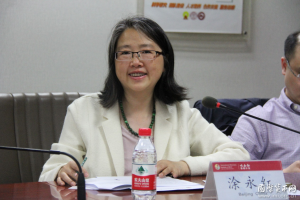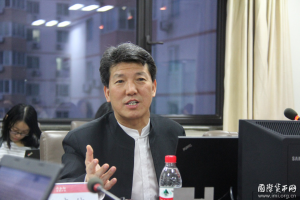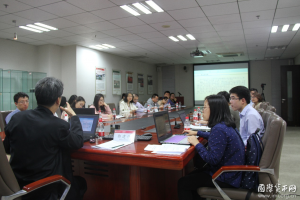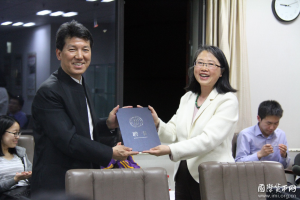Macro-Finance Salon (No. 59): Practice of the Macro-Finance in Xinjiang
2017-04-24 IMI Mr. Guo first talks about the background of the Macro-Finance and the New Finance in Xinjiang and points out that under the new normal, the Macro-Finance and the New Finance can promote the transmission of monetary policies, serve the real economy, and adapt to the diversified and integrated corporate service demands. Meanwhile, since the renminbi is steadily improving its international position, the Macro-Finance and the New Finance can bring into full play the regional advantage of Xinjiang as the core region of the Silk Road Economic Belt. The Opening-Up Strategy along the Western Border also provides great opportunities for industrial restructuring in Xinjiang. He mentions that the Macro-Finance focuses on client needs, conducts all-dimensional cooperation with China Banking Regulatory Commission, Securities Regulatory Commission, and Insurance Regulatory Commission, and explores new financing products and models in line with regional development. The Macro-Finance is problem and practice oriented and provides one-to-one diagnoses and customized solutions targeted at financing inaccessibility and unaffordability of different corporations. The New Finance theory framework vigorously adapts to economic globalization and financial integration, enables wider financial bilateral opening-up, and coordinates the new integrated financial service model of domestic and foreign currencies onshore and offshore. The framework establishes the financial cooperation mechanism, make breakthroughs in the cross-border renminbi business, and uses foreign exchange management transformation as an accelerator to establish a long-term, stable, sustainable, and risk-controllable financial protection system that serves Xinjiang, the core region of the Silk Road Economic Belt.
Mr. Guo first talks about the background of the Macro-Finance and the New Finance in Xinjiang and points out that under the new normal, the Macro-Finance and the New Finance can promote the transmission of monetary policies, serve the real economy, and adapt to the diversified and integrated corporate service demands. Meanwhile, since the renminbi is steadily improving its international position, the Macro-Finance and the New Finance can bring into full play the regional advantage of Xinjiang as the core region of the Silk Road Economic Belt. The Opening-Up Strategy along the Western Border also provides great opportunities for industrial restructuring in Xinjiang. He mentions that the Macro-Finance focuses on client needs, conducts all-dimensional cooperation with China Banking Regulatory Commission, Securities Regulatory Commission, and Insurance Regulatory Commission, and explores new financing products and models in line with regional development. The Macro-Finance is problem and practice oriented and provides one-to-one diagnoses and customized solutions targeted at financing inaccessibility and unaffordability of different corporations. The New Finance theory framework vigorously adapts to economic globalization and financial integration, enables wider financial bilateral opening-up, and coordinates the new integrated financial service model of domestic and foreign currencies onshore and offshore. The framework establishes the financial cooperation mechanism, make breakthroughs in the cross-border renminbi business, and uses foreign exchange management transformation as an accelerator to establish a long-term, stable, sustainable, and risk-controllable financial protection system that serves Xinjiang, the core region of the Silk Road Economic Belt.
 Mr. Guo introduces the practice of the Macro-Finance and the New Finance in Xinjiang. Xinjiang establishes and improves the statistical framework of the Macro-Finance to continuously expand the statistical scope from traditional credit to social financing to the Macro-Finance. Xinjiang establishes “one mechanism and three platforms” supported by information intelligence, namely the transmission and promotion mechanism of monetary and credit policies, and the integrated Xinjiang corporate service platform, cross-border financial service platform, and the Internet Plus Inclusive Finance service platform under the framework of the Xinjiang Institute of Finance. Xinjiang is committed to differentiated treatment and financial service in line with its regional conditions.
Mr. Guo introduces the practice of the Macro-Finance and the New Finance in Xinjiang. Xinjiang establishes and improves the statistical framework of the Macro-Finance to continuously expand the statistical scope from traditional credit to social financing to the Macro-Finance. Xinjiang establishes “one mechanism and three platforms” supported by information intelligence, namely the transmission and promotion mechanism of monetary and credit policies, and the integrated Xinjiang corporate service platform, cross-border financial service platform, and the Internet Plus Inclusive Finance service platform under the framework of the Xinjiang Institute of Finance. Xinjiang is committed to differentiated treatment and financial service in line with its regional conditions.
 At last, Mr. Guo points out that the Macro-Finance and the New Finance’s service function is improperly constrained by the unbalanced financial structure and real economic structure in Xinjiang. The Macro-Finance and the New Finance should work hard to resolve the long-term financial needs, improve the capital contribution rate, and vigorously support the service industry to stimulate the social capital vitality in Xinjiang. He shares his thinking on the Macro-Finance and the New Finance from the above-mentioned aspects.
At last, Mr. Guo points out that the Macro-Finance and the New Finance’s service function is improperly constrained by the unbalanced financial structure and real economic structure in Xinjiang. The Macro-Finance and the New Finance should work hard to resolve the long-term financial needs, improve the capital contribution rate, and vigorously support the service industry to stimulate the social capital vitality in Xinjiang. He shares his thinking on the Macro-Finance and the New Finance from the above-mentioned aspects.
 After his speech, Professor Tu Yonghong presented Mr. Guo Jianwei the Letter of Appointment and appointed him as a member of IMI Academic Committee.
After his speech, Professor Tu Yonghong presented Mr. Guo Jianwei the Letter of Appointment and appointed him as a member of IMI Academic Committee.
